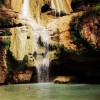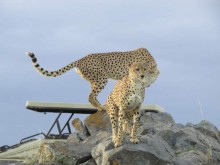Private guides and guided tours in Madagascar
Private guides in Madagascar
Private Guide in Antsirabe - Lanto
(Member Since 2013) Languages: French, EnglishMaking someone happy is not easy and yet we love to try this challenge. The definition of success is left to the discretion of each individual and we'll let you be the judge of what you want to experience with us.
Private Guide in Antananarivo - Tony
(Member Since 2022) Excursions/tous in the following cities: Antananarivo, Andasibe, Toamasina, Anjajavy, Morondava Languages: EnglishHello there !!! I am Tony, legal National tour guide a passionate traveler and a landscape and wildlife photographer, local Culture. In my opinion, I believe the most important things in life are traveling...
Private Guide in Antsirabe - Aina
(Member Since 2015) Languages: French, EnlishHi everyone! Concerning me? You could just call me Aina, I am a man and apart reading, I like exchanging something with unknown people mainly to tell them about my country which is Madagascar with its various cultures and custums, its stories, malagasy people's way of life and its important wildlife.

Madagascar
Language: French
Currency: Malagasy franc (MGF)
Calling Code: +261
CAPITAL CITY OF Madagascar: Antananarivo
LANGUAGE OF Madagascar: French
CURRENCY OF Madagascar: Malagasy franc (MGF)
COMMENTS ABOUT Madagascar:
Madagascar, or Republic of Madagascar (older name Malagasy Republic), is an island nation in the Indian Ocean, off the southeastern coast of Africa.
Cities : Antananarivo (Capital), Toamasina, Morondava, Fianarantsoa, Toliara, Majunga, Antsiranana, Taolagnaro, Antsirabe, Ambositra
Eat : plate of rice, laoka like chicken, beans, pork, rice water, homemade yogurt, Bananas, rice cakes
Time zone : EAT (UTC+3)
Calling code : +261
Formerly an independent kingdom, Madagascar became a French colony in 1896, but regained its independence in 1960. During 1992-93, free presidential and National Assembly elections were held, ending 17 years of single-party rule. In 1997, in the second presidential race, Didier RATSIRAKA, the leader during the 1970s and 1980s, was returned to the presidency. The 2001 presidential election was contested between the followers of Didier RATSIRAKA and Marc RAVALOMANANA, nearly causing secession of half of the country. In April 2002, the High Constitutional Court announced RAVALOMANANA the winner.
CLIMATE OF Madagascar: tropical along coast, temperate inland, arid in south
RELIGION OF Madagascar: Indigenous beliefs 52%, Christian 41%, Muslim 7%
POPULATION OF Madagascar: 17,501,871 (July 2004 est.)>>>
ECONOMY OVERVIEW OF Madagascar: Having discarded past socialist economic policies, Madagascar has since the mid 1990s followed a World Bank and IMF led policy of privatization and liberalization. This strategy has placed the country on a slow and steady growth path from an extremely low level. Agriculture, including fishing and forestry, is a mainstay of the economy, accounting for more than one-fourth of GDP and employing four-fifths of the population. Exports of apparel have boomed in recent years primarily due to duty-free access to the United States. Deforestation and erosion, aggravated by the use of firewood as the primary source of fuel are serious concerns. President RAVALOMANANA has worked aggressively to revive the economy following the 2002 political crisis, which triggered a 12% drop in GDP that year. Poverty reduction and combating corruption will be the centerpieces of economic policy for the next few years.



 French
French Spanish
Spanish Russian
Russian


















































